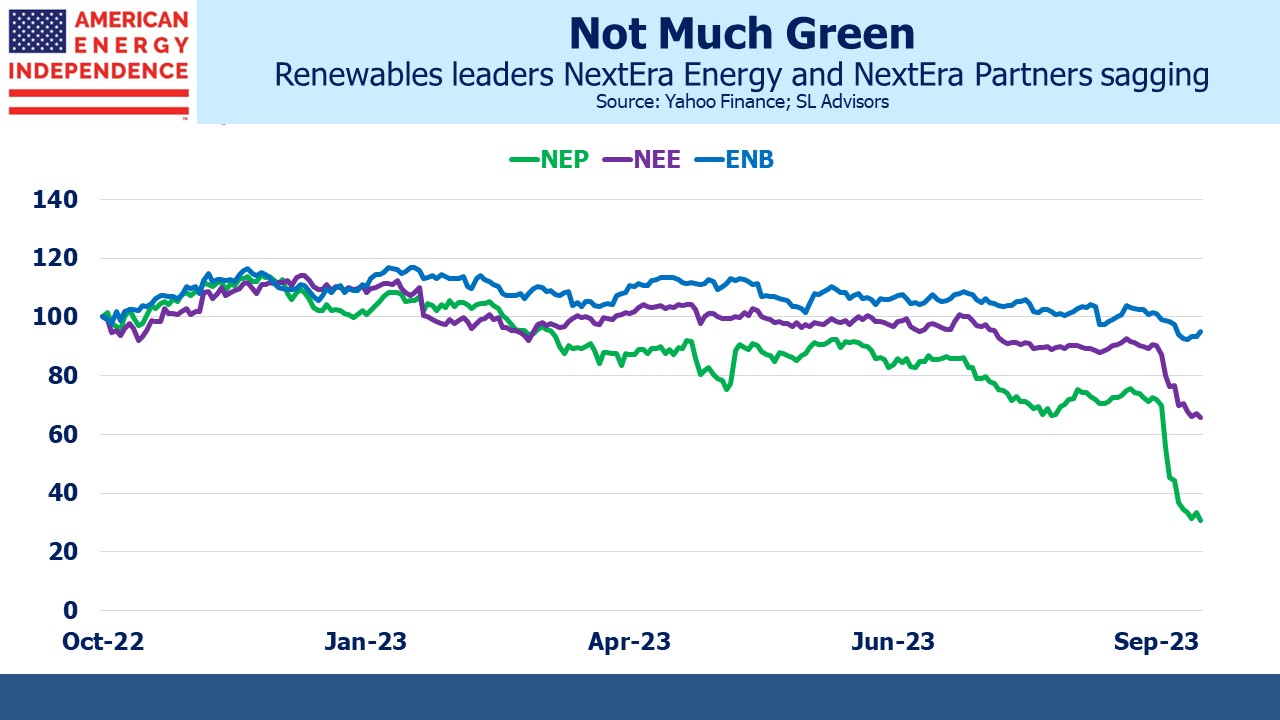Only last week a new investor asked how the pipeline sector might respond to geopolitical risk. Conflict in any of the world’s trouble spots is bad for most sectors and the market overall. But energy is different, because the specter of supply disruption draws in buyers.
Saturday’s massive terrorist attack on Israel by Hamas is an example. Developments will render this post outdated almost as soon as it’s written, but the surprise and initial casualties suffered by the Israelis rank this up with the 1973 Yom Kippur War or even the war that immediately followed the creation of Israel in 1948.
Less than two weeks ago National Security Adviser Jake Sullivan said, “The Middle East region is quieter today than it has been in two decades.” He did add that this could easily change.
Israel hardly produces any oil, but Iran’s backing of Hamas risks broadening the conflict. Near term fluctuations in crude will be driven by events on the ground, but an enduring risk premium is likely to remain for some time. A return to the status quo ante seems unlikely, so energy exposure offers optionality to protect the rest of your portfolio against further developments.
Fertilizer stocks have risen. Israel exports 3% of the world’s fertilizer potash. Iran is a key regional producer of nitrogen derived from its supplies of natural gas.
Looking out over the next few months, the rapprochement between the US and Iran that was potentially leading to increased Iranian exports looks less certain now. Saudi Arabian supply may not change as a result of this latest war, but it’s hard to see why they’d be more likely than before to pump more to help western economies.
Energy security is once more a winner. The US is energy-independent and a stable supplier of oil and gas. For natural gas, which is expensive to transport, trade via Liquefied Natural Gas (LNG) provides greater flexibility than a pipeline. Germany’s Nordstream link to Russia will remain a lesson for many LNG buyers around the world. Pipelines represent a permanent link between buyer and seller, creating a mutual dependence that survives as long as neither sees a benefit in breaking it. Finland and Estonia are investigating a gas leak in a pipeline connecting their two countries, and sabotage is suspected.
Four years ago we considered the tinder box that is the Middle East (see Investors Look Warily at the Persian Gulf). Last year Russia pivoted from Germany to China to export its Siberian natural gas and has been negotiating a long term agreement ever since. Current circumstances make such trade mutually beneficial, but both countries will be wary of becoming too dependent on the other. Russia has few other choices and China, already the world’s biggest LNG importer, is adding additional receiving terminals (see LNG Growth Faces Few Headwinds).
There are very few pairs of countries where stable, long term relations can be sufficiently assured to justify a pipeline connection. The US and Canada is one of the few.
This is why LNG is preferable to pipelines for trade. An era of declining globalization, onshoring and shortened supply lines makes flexibility more important to buyers. US LNG exports will probably double over the rest of the decade, providing the cleanest fossil fuel reliably to meet the world’s growing desire for natural gas while also displacing coal.
The initial market response of lower bond yields, stable equity markets and higher crude oil makes midstream energy infrastructure more attractive. The rebound in stocks during the day Monday shows the sensitivity to interest rates. The Equity Risk Premium shows the market to be historically expensive (see Why Are Real Yields Rising?).
Enbridge yields over 8% and has raised its dividend for the past 28 years, as we noted on Sunday. It is in our opinion an attractive investment, even if bond yields resume their ascent.
We’re heading into earnings season, which should provide further confirmation of the sector’s continued cash flow growth, declining leverage and focus on shareholder returns via dividend hikes and buybacks. MPLX is among the names expected to benefit from inflation-linked tariff increases, an under-appreciated feature of regulated pipelines that we’ve noted in the past.
NextEra Energy (NEE) and its MLP NextEra Partners (NEP) both continue to drop, reflecting investors’ waning appetite for renewables-oriented companies. NEP has lost two thirds of its value YTD, following what should have been only mildly disappointing news that future dividend growth was being halved. With a 14.5% yield, paying dividends is a waste of NEP cash. We’ve seen this story before with other MLPs. If the stock doesn’t rebound a dividend cut will be inevitable.
The post Terrorists Create Geopolitical Risk appeared first on SL-Advisors.


